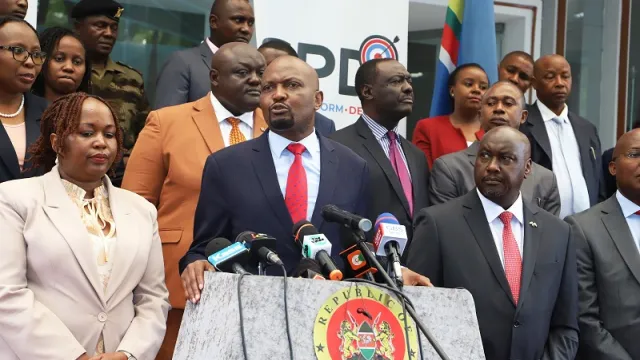Black tax hit Kenyans as State switches up service fees

Black tax hit Kenyans as State switches up service fees
The government is reviewing old laws to increase charges for bureaucratic services in an effort to generate more revenue from ministries, departments, and agencies, popularly known as "appropriation in aid" (AIA).
National Treasury, as well as the Ministries of Ports, Lands, and Housing, have all turned to existing legislation to raise charges for services in an attempt to collect more funds to support their operations.
The government is committed to increasing revenues and has set higher targets for ministries, departments, and agencies to generate funds from fees, fines, and levies. This will result in higher costs for accessing state services.
Already, the Ministry of Lands has initiated a review of land rates in Nairobi, Mombasa, Nakuru, Kisumu, Eldoret, and Kiambu in an effort to raise an additional Kes8 billion. Additionally, the Treasury reinstated the search and registration fees that were waived in 2020, aiming to increase revenues from land transactions.
The Treasury has also announced plans to collect about Kes500 million annually from contractors and businesses that supply goods to it through the proposed Public Procurement Capacity Building Levy, which was gazetted by Treasury Cabinet Secretary Njuguna Ndung'u.
The government intends to deduct 0.03 percent of the contract price from contractors and suppliers to fund the training of public procurement officers and private businesses engaged in government-related public procurement.
The Kenya Ports Authority (KPA) is planning to review the current charges imposed on its services. The current tariff, which was approved in December 2012, has remained in effect with only a few minor changes. The KPA now seeks to conduct a comprehensive review of these charges.
Read also: KRA to onboard informal sector players into the tax net
Increase rents for government estates
The Ministry of Housing and Urban Development has announced a 10 percent increase in rents for government estates. This adjustment is due to the absence of regular rent reviews since 2001 when civil servants had their housing allowances reviewed by President Mwai Kibaki.
There is an unspoken government policy that aims to transform the bureaucracy into a revenue-generating machine, running parallel to the Kenya Revenue Authority. This policy aims to generate more revenue from access to state services, as well as imports and exports.
Unlike taxes, which are typically announced in annual cycles that can be easily tracked, these fees and commissions are introduced quietly, akin to a relative who takes a portion of your salary without your knowledge. This has been referred to as a "black tax" since it is introduced subtly to avoid public outcry.
An attempt to make this policy official through Cabinet Secretary (CS) for Public Service, Performance, and Delivery Management, Moses Kuria, to introduce a fee for services offered at Huduma Centers, has faced public backlash.
In clarifying his remarks, CS Kuria mentioned that all services offered by the government through the platform, including marriage, passport issuance, identity card replacement, company searches, licensing, etc., could see an increase in fees. This increase is due to the departments using the platform being required to pay new fees to Huduma Centers.



